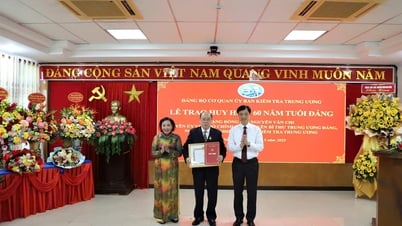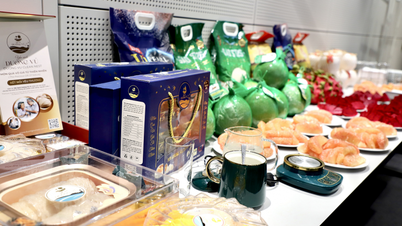In the context of strong globalization, Vietnamese businesses are increasingly looking to international e-commerce platforms such as Amazon, eBay, Alibaba... to expand their markets.

Hung Yen longan products are promoted on Sendo. Illustrative photo
However, protecting brands in cyberspace, especially when exporting online, remains a major challenge. Therefore, this is not only a legal issue but also a key factor in maintaining competitiveness and ensuring trust with global consumers. Any negligence in protecting brands can lead to serious consequences, from losing customers to negatively affecting the image of the business.
A representative of the Department of E-commerce and Digital Economy ( Ministry of Industry and Trade ) said that due to a lack of attention to intellectual property protection, many famous Vietnamese brands were exploited by foreign enterprises, or when entering foreign markets, they were registered by competitors.
In fact, many Vietnamese brands such as Vinataba cigarettes, Trung Nguyen coffee, Phu Quoc fish sauce, Nang Huong rice, etc. have been pre-registered in the United States. At that time, businesses will spend a lot of money and time hiring lawyers to sue to reclaim the brand. In some cases, they even have to buy back their own brand at a high price or accept to use another brand in this country.
According to Amazon Global Selling Vietnam, the awareness of Vietnamese sales partners on the importance of building, protecting brands and protecting intellectual property rights is gradually improving. In the past three years, the number of Vietnamese brands registering their brands on Amazon (Brand Registry) has increased 7 times and the time for Vietnamese sales partners to move from the stage of registering a sales account to registering a brand has been shortened by an average of 85%.
Some Vietnamese businesses currently doing business on Amazon have paid attention to registering their trademarks in the United States. For example, since June 2020, Longevity Sea Grapes, a Vietnamese seaweed brand, has successfully registered its trademark in the United States to protect and strengthen its reputation.
Or recently, the dried fruit brand Nam Huy in Dong Thap also successfully registered the Nam Huy trademark in the United States through the Go Export e-commerce export support program implemented by the Center for Information Technology and Digital Technology (Department of E-commerce and Digital Economy ) with partners and experienced experts in the field of online export.
When Vietnamese enterprises expand their business activities on international e-commerce platforms and want to protect their brands, it is extremely important to understand the regulations and procedures for registering and protecting brands in each country and on each trading floor.
According to a representative of the Department of E-commerce and Digital Economy, for Vietnamese enterprises that want to implement online exports via the Amazon platform, they should soon have a plan to register for trademark protection.
In the United States, trademarks are protected through the United States Patent and Trademark Office (USPTO). The trademark registration process usually takes 1 year or more depending on the case, including filing an application, paying fees, and going through a review process, in which the USPTO will check whether the trademark is identical or confusingly similar to a previously registered trademark. Usually, there will be many legal procedures involved, so businesses should find a reputable law firm in Vietnam for advice and support in registering a trademark in the United States.
Currently, the Go Export Program implemented by the Center for Information Technology and Digital Technology (Department of E-commerce and Digital Economy) is also cooperating with legal experts and law firms with extensive experience in trademark registration and dispute resolution in the international market.
To help business owners protect their products and brands, Amazon has built the Amazon Brand Registry program since 2017. To join the Amazon Brand Registry, businesses need to own a registered trademark and be active in the country where they want to register. In addition, Amazon also accepts businesses with pending trademark applications at some trademark offices such as UPSTO...
To date, Amazon only accepts trademarks granted by trademark offices in a number of countries such as the United States, Brazil, Canada, Mexico, Australia, India, Japan, France, Germany, etc. Therefore, Vietnamese businesses usually register their trademarks in the United States.
The representative of the Department of E-commerce and Digital Economy also pointed out that businesses that intend to do business systematically and professionally on Amazon should learn about and register to participate in the Amazon Brand Registry program because of the outstanding advantages that the program brings. In particular, some benefits that can be mentioned when businesses register their brands on Amazon include Amazon providing tools to help protect brands from counterfeiting and copyright infringement.
Along with that, you can open a professional online store on Amazon; be provided with more advanced and effective marketing tools; access to detailed analytics and reporting data, helping you better understand product performance and customer behavior. In addition, you will receive priority and fast support from Amazon for product and listing-related issues; Amazon Brand Registry also allows brands to easily report and handle copyright infringement and counterfeit issues.
According to trade experts, protecting brands when exporting online via e-commerce platforms is not only a strategic move to protect the rights and image of Vietnamese businesses but also an effective way to expand markets and increase revenue. Vietnamese businesses need to seize this opportunity to not only protect their products but also improve their competitiveness and build reputation in major markets.
Source




![[Photo] Prime Minister Pham Minh Chinh chairs a meeting on the implementation of the Lao Cai-Hanoi-Hai Phong railway project.](https://vphoto.vietnam.vn/thumb/1200x675/vietnam/resource/IMAGE/2025/5/20/0fa4c9864f63456ebc0eb504c09c7e26)






























































































Comment (0)